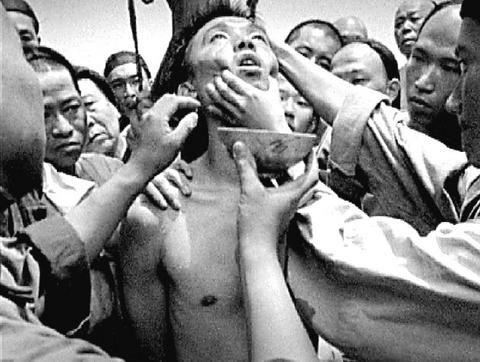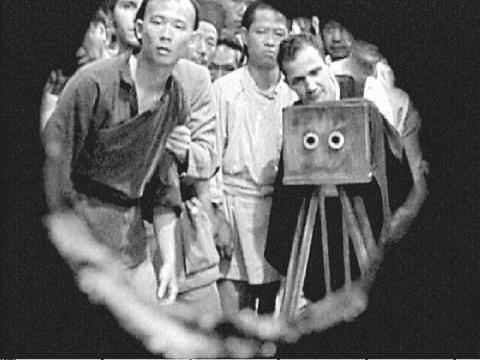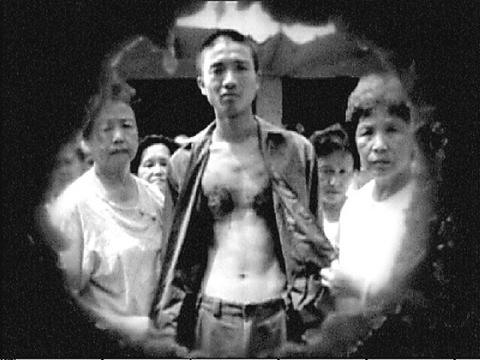The international exhibition of the Taipei Biennial: Great Theatre of the World is currently on view at the Taipei Fine Arts Museum until March 2, 2003. Using the theme of the world as a theatre allows for some reflections for the audience on how we are all actors in this game of life.
One dynamic work that stands out from the rest is the film Lingchi -- Echoes of a Historical Photograph by Taiwanese artist Chen Chieh-jen (陳界仁) who combines a fictive imagining of a real historical event with the current tragedy of local Taiwanese laborers.
Shot using 16mm film and transferred to DVD, the silent black and white movie (approximately 20 minutes long) is beamed onto large screens with three projectors, thus creating an effect that is powerful, mystical, majestic and monumental. At times all three projections are in sync, and at other times the screens show three different images.

COURTESY OF CHEN CHEH-JEH
The film is based on the famous 1905 photograph of a man being punished the Manchu way, by being cut into pieces for the crime of murder. His ecstatic expression is attributed to opium, which was administered to prolong the torture. Philosopher Georges Bataille discussed this photo extensively in his book The Tears of Eros and noted the correlations between the beauty of religious eroticism, divine ecstasy and the shocking horror of cruel torture.
Chen's cinematic close-ups of the victim's face bring to mind images of blissful euphoria, homoeroticism, and religious crucifixion. Slow motion close-ups of a hand holding a knife, the grim expressions of the crowd of ponytailed bystanders, blood dripping down the crowd's legs and flowing into the ground are eerie, but surprisingly not as violent as what one might expect considering Chen's topic. The film is oddly un-sadistic, even though the content is of death by dismemberment.
Interspliced with the staged reenactment of the torture scene are scenes where the camera slowly pans above a crowd of silent women. These women are factory workers in Taoyuan, and due to various tragic events such as occupational hazards or unemployment, they no longer are able to work. Chen links these contemporary women to the 1905 victim. Due to the women's circumstances, which are often beyond their control, they are also suffering a long torture, but without any bliss.

Chen came to international prominence with his large computer images of similar torture scenes. However, this film is a departure from those past works. By linking the historical with the contemporary social and economic situation in Taiwan, Chen has created an extremely powerful work that links the past with the present, the fictive with the documentary. He is also specific to the local situation, while remaining universal.
One irritating drawback to viewing Lingchi is the encroaching cacophony of sounds from other artists' installations, which dramatically shatters the silence of this overwhelmingly poetic work. However, this is not a reason to avoid seeing the work. It's a cinematic experience worth remembering.


The 2018 nine-in-one local elections were a wild ride that no one saw coming. Entering that year, the Chinese Nationalist Party (KMT) was demoralized and in disarray — and fearing an existential crisis. By the end of the year, the party was riding high and swept most of the country in a landslide, including toppling the Democratic Progressive Party (DPP) in their Kaohsiung stronghold. Could something like that happen again on the DPP side in this year’s nine-in-one elections? The short answer is not exactly; the conditions were very specific. However, it does illustrate how swiftly every assumption early in an

Francis William White, an Englishman who late in the 1860s served as Commissioner of the Imperial Customs Service in Tainan, published the tale of a jaunt he took one winter in 1868: A visit to the interior of south Formosa (1870). White’s journey took him into the mountains, where he mused on the difficult terrain and the ease with which his little group could be ambushed in the crags and dense vegetation. At one point he stays at the house of a local near a stream on the border of indigenous territory: “Their matchlocks, which were kept in excellent order,

Jan. 19 to Jan. 25 In 1933, an all-star team of musicians and lyricists began shaping a new sound. The person who brought them together was Chen Chun-yu (陳君玉), head of Columbia Records’ arts department. Tasked with creating Taiwanese “pop music,” they released hit after hit that year, with Chen contributing lyrics to several of the songs himself. Many figures from that group, including composer Teng Yu-hsien (鄧雨賢), vocalist Chun-chun (純純, Sun-sun in Taiwanese) and lyricist Lee Lin-chiu (李臨秋) remain well-known today, particularly for the famous classic Longing for the Spring Breeze (望春風). Chen, however, is not a name

There is no question that Tyrannosaurus rex got big. In fact, this fearsome dinosaur may have been Earth’s most massive land predator of all time. But the question of how quickly T. rex achieved its maximum size has been a matter of debate. A new study examining bone tissue microstructure in the leg bones of 17 fossil specimens concludes that Tyrannosaurus took about 40 years to reach its maximum size of roughly 8 tons, some 15 years more than previously estimated. As part of the study, the researchers identified previously unknown growth marks in these bones that could be seen only